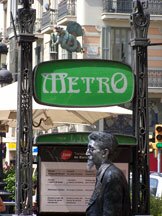
Wells
StudyAbroad

What do students say?
"Spending a semester in Sevilla was definitely one of the most valuable experiences of my college career. The Wells program offers so many opportunities that you don't get from other programs - travel, classes, dance lessons. The program is very well organized with an easily accessible support network, and is flexible enough to deal with any unforeseen circumstances that may arise."
(B.J., Yale University)
(B.J., Yale University)
Live Life as the Spanish Do - in Sevilla

Classes
All courses in the Wells College Program in Sevilla are designed for American students and are conducted in Spanish by regular faculty members of the University of Sevilla.
The following list is a selection of the courses this program offers.
- Spanish Semantics
The object of this course is to develop the theoretical and practical knowledge of Spanish Lexicology and Semantics. The theoretical aspects will form the basis for a progressive and gradual enrichment of the student's vocabulary through the study of new words, modisms and colloquial expressions. - Spanish Syntax
This course offers the student a complete view of the structure of the Spanish language. The theoretical study of the language will be supported by practical in-class analyses. - Spanish Phonetics
This course is designed to give the student a knowledge of Spanish phonetics. Standard Spanish, as the point of departure, will be contrasted to other social and dialectical variances, as well as to other languages. - Contemporary Spanish Film
This course will focus on contemporary Spanish film as an exponent of Spain's cultural perspective. Film as an audio-visual art form will be analyzed in its social, historical, linguistic and literary contexts. - Human Geography of Spain
- History of Spanish Cinema
- Cultural Anthropology of Andalucia
An analysis of the primitive societies of Andaluc’a from the Paleolithic, through the formation of Neolithic tribal societies and the emergence of Tartessian society in the Bronze Age, to the colonization of the region by the Greeks and Romans. - Cultural Anthropology of Latin America
The course will cover independence movements and the formation of nations; social structures and their evolutions; the liberal tradition and the socialist experience; military dictatorships and populist movements; twentieth century revolutions; and modern democracies. - Intro to Contemporary Spanish History
A study of the evolution of modern Spanish history: the War of Independence, the Restoration, the dictatorship of Primo de Rivera, the Republican experience, the Civil War, and the dictatorship of Franco. Special attention will be given to the rise of democracy in contemporary Spain and how it has been achieved. - Contemporary Latin American History
- History of the Spanish Language
A study of the evolution of the Spanish language from its origins in pre-Roman times to the present. Emphasis will be given to the most important linguistic developments (phonetic, morphosyntactic, lexical, etc.) that have contributed to the distinctive characteristics of the Spanish language. - Advanced Conversation and Composition
The aim of this course is to give the student a solid command of the language by coordinating conversational drills (discussion, presentations, lectures, and videos) with compositions and essays. - Advanced Grammar
An in-depth study of the structure of the Spanish language by comparing it to English. The purpose of this course is to give the student a practical command of Spanish grammar as well as to develop a deeper understanding of the differences and similarities between Spanish and English. - 20th Century European Art
- Introduction to Western Classical Music
- Modern Latin American Literature
A survey from Modernism to contemporary literature. Special attention will be given to Josˇ Mart’, Rubˇn Dar’o, Horacio Quiroga, Gabriel Garc’a Marquez, Jorge Luis Borges, Miguel Angel Asturias, and Julio Cortazar./li> - Politics and the European Union
A close study of the evolution of the European Union in the second half of the twentieth century, its political and economical objectives, and the problems and challenges for unification and expansion in the twenty-first century. - Literary Theory
This course offers the student an overview of the different theories of criticism and their applications to the literary language. The study will not only concentrate specifically on Spanish texts, but will expand to other literatures in order to deal with the different aspects of comparative literature and its diverse forms of textual analysis. - Diplomatic Relations between US & Latin America
The relations between the United States and Central and South America will be studied, concentrating on the influential role that U.S. policies have exerted in the shaping of modern Latin American states. - Golden Age Theater in Spain
The purpose of this course is to give the student a clear view of the importance of theater during the Golden Age (XVI and XVII centuries) both as a literary form and as spectacle. Plays will be analyzed from the ideological, social and literary points of view. - Spanish Literature XVIII-XX
A survey of Spanish literature covering the Enlightenment, Romanticism, Costumbrism, Realism and Naturalism, Modernism, Generation of '98, and Pre- and Post-Civil War, as well as current literary movements. - Latin American Contemporary Poetry
A study of Latin American poetry dealing with the avant-garde movements. The creationism of Huidobro; Argentinian Ultra’stas; Mexican "estridentistas;" Negro poetry; and the poetry of Cesar Vallejo, Pablo Neruda and Octavio Paz. - Contemporary Spanish Novel
- Archeology of Andalucia
An analysis of the primitive societies of Andaluc’a from the Paleolithic, through the formation of Neolithic tribal societies and the emergence of Tartessian society in the Bronze Age, to the colonization of the region by the Greeks and Romans. - Economy & Society in Contemporary Spain
The aim of this course is to give the student a clear view of what constitutes today's Spanish society. Topics to be studied include: the diversity of the environment and its effect on people; demographics; productivity; industrial development; and the political relations between the different regions of Spain. - Medieval Spain: History of Three Cultures
A contrast of the fundamental aspects of the European Middle Ages with its Spanish counterpart. Special emphasis will be given to the importance of the three cultures (Christian, Muslim and Jewish) in the evolution of Spanish literature and in the role that Spain played as a transmitter of culture to the rest of Europe. - History of Slavery in the Americas
- Contemporary Spain in the International Arena
- The Influence of Islam in Spanish Literature
- The Flamenco: Cultural Impact in Andalucia
- Cultural Anthropology of the Mediterranean
A study of the anthropological diversity of the Mediterranean peoples and the factors behind that diversity, using events of the recent past to analyze the roots and evolution of the region. - Cervantes and El Quijote
A close reading of Cervantes' masterpiece as the premier example of Baroque literature and as the major contributor to the development of the modern novel.
Students with a very strong background in the language will have the opportunity of taking courses from the regular university curriculum with Spanish students.
Professor Miguel L. Gil - Director of Study Program in Spain
Wells College 170 Main Street Aurora, NY 13026
Office: 315-364-3280 | Secretary: 315-364-3288 | Fax: 315-364-3257
email:
Wells College 170 Main Street Aurora, NY 13026
Office: 315-364-3280 | Secretary: 315-364-3288 | Fax: 315-364-3257
email:
